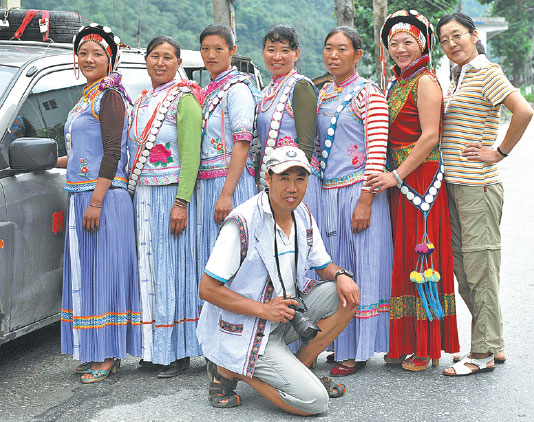Photographer zooms in on goal
Fourth journey to document changes among China's 56 ethnic groups becomes a celebration
Fifty-two-year-old photographer Wang Chengwang will begin a solo 200-day odyssey by automobile from Harbin, Heilongjiang province, in July to document 56 ethnic groups.
It will be his fourth such journey, following the same route he traveled in 2005, 2010 and 2013.
"It can be seen as the celebration of the 10th anniversary of the first journey, which is of great significance to me," said Wang. "I want to pay a return visit to ethnic groups I visited before."
With the rapid development of society, some formerly isolated ethnic group settlements have had opportunities to communicate with the outside world. It is a good chance for them to learn more about modern civilization, but it can be a challenge for them to preserve original ethnic characteristics, Wang said.
"I want to grasp the changes of the ethnic groups through my photographs, taken at different times," said Wang.
When he was young, Wang spent a lot of time lugging around a camera belonging to his photographer father, and shooting pictures of people, buildings, cars or anything else he felt was special. His father's influence was substantial.
When he reached the age to go to work, Wang worked in a local machinery factory, following in his mother's footsteps. The work didn't prevent him from taking pictures in his spare time.
In 1998, a job posting for photojournalists from a newly founded local newspaper attracted his attention. Although his age - 35 - exceeded the limit, he took his photographs to the newspaper office. His excellent portfolio and dedication to photography helped him land a job.
In 2005, on the 56th birthday of the country, the newspaper decided to send a journalist to visit all of China's 56 ethnic groups.
Wang's experience visiting Lhasa via the Qinghai-Tibet Highway and Sichuan-Tibet Highway by motorcycle twice made him the top candidate for the task.
During that journey, he carried out multiple duties: driver, guide and repairman, on top of being a photojournalist.
During the trip, he experienced difficulties ranging from extremely bad weather to poor road conditions and language barriers.
"However, the hardest part for me to bear was loneliness and homesickness," Wang said. "I could only look at photos of my family again and again. At that time, the communication was not so developed as now. Most of the time, I chose to send phone messages to my wife every day to let her know my situation."
Because of the limitations of cellphones at that time, his wife had to combine sequences of short messages into a notebook.
"That has become one of the most precious possessions in my family," Wang said.
When his wife was mentioned, Wang reacted with apparent pain.
"In the past 10 years, I have spent much of my time outside, providing little care for my family," said Wang. "My wife had to look after our son and her parents, as well as my parents. I missed lots of important parts of my son's growth."
Not only that: The latter two journeys were undertaken at his own expense, depleting almost all their savings.
"Besides the small apartment where we live now, I have no other estate and little money," said Wang. "But I have countless precious photos of the 56 groups in our country. As far as I know, there is no other person in China who has completed such a work."
To save money, he usually slept in his car and cooked with implements he carried.
"I once slept in the small car for 19 consecutive days," said Wang. "The tiny space made sleep a kind of suffering. Every day when I got up, I ached all over."
Every time he finished a journey, Wang would spend a great deal of time organizing the photos and compiling them into a photo book.
"In the books, I added some stories of incidents that happened along the way," Wang said. "I hope the book can become more vivid, with various forms."
His coming journey will span the summer, autumn and winter, including Spring Festival in 2016.
"It will be the first time for me to celebrate Spring Festival without my family, but it will be significant for me to experience the different celebrations of ethnic groups," Wang said. "And of course I will record everything with my camera."
zhouhuiying@chinadaily.com.cn
|
Photographer Wang Chengwang poses for a photo in 2013 with people from the Lisu ethnic group in Fugong county, Yunnan province. Wang Chengwang / for China Daily |

























